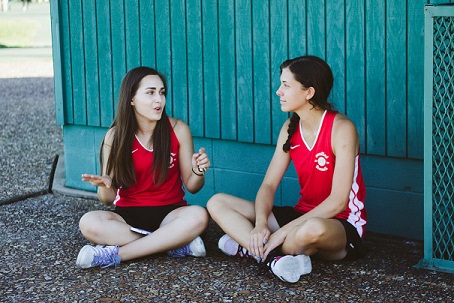How to elevate your personal success to a Public Victory!
Last week, we broke down The Private Victory, the first three habits in The 7 Habits of Highly Effective Teens. As a part of the Leadership in Action Summits at Harvard University, students will attend a 7 Habits leadership workshop. If you missed the post, you can read it here.
This week, we’re diving into the next three habits, known as The Public Victory. Last week was all about you — how to take control of your future, make a plan to meet your goals, and prioritize! Those habits cultivate independence. The next habits focus on your relationships with others. We live in a connected world. The only way to be truly effective is to take people with you! Let’s get started.
Habit 4: Think win-win
In so many areas of our lives, we find ourselves competing against others: at an audition, out on the field or court, even in the classroom. Situations like that are win-lose because only one person or team can come out on top. Habit 4 teaches us that although win-lose is a normal part of life sometimes, win-win is a better approach in personal relationships.
Think about it this way: if you’re playing a game of Monopoly, you’re competing with other players to populate Park Place and Boardwalk with your hotels. And, if I ask who’s winning, you could answer me. That’s win-lose. If, however, you were spending the afternoon with your best friend and I asked who was winning the afternoon or the friendship, you probably wouldn’t know what to say. Why? Because in healthy friendships one person doesn’t win while the other loses. You both win! Win-win!
“Strong people don’t put others down. They lift them up. ~ Michael P. Watson”
The key to Habit 4 is mindset. Do you have an abundance mentality or a scarcity mentality? When you see a classmate, friend, or sibling succeed do you feel happy, or do you feel envious? If you share in your successful peer’s joy, it’s because you know her success doesn’t diminish your own. In the game of life, there’s enough success to go around! If you feel self-conscious or jealous, perhaps it’s because you’re stuck in a win-lose pattern of thinking.
Adjusting to a win-win mindset or seeking a win-win solution in the event of conflict doesn’t make you weak. It takes courage and consideration to find a strategy that works for everyone. Try it! The next time a situation arises where you find yourself in a lose-win or lose-lose position, have the courage to be honest and the consideration to find a better option. If you find yourself in a relationship with someone whose idea of winning requires you to lose, it might be time to reevaluate your connection to that person.
Habit 5: Seek first to understand, then to be understood
I’m going to let you in on one of the world’s worst-kept secrets: people just want to feel understood. If you’ve ever been either unintentionally or purposefully misunderstood, you know how frustrating and demoralizing that can feel. Conversely, if you have had a conversation with someone who truly “gets you,” you know how uplifting it can be.
The catchphrase for Habit 5 is ‘listen to people sincerely,’ and the key is sincerity. Ask yourself what it looks like when someone listens to you sincerely. Really stop and think about it for a minute.
In all likelihood you thought about the person’s body language, her tone of voice, and her words. You may be familiar with the acronym SLANT, which stands for sit up, lean forward, ask and answer questions, nod as you listen, and track the speaker. This is just one tool to help you be a more active listener.
It would be strange if you went into a doctor’s office and the doctor wrote you a prescription before you ever explained your illness. That’s what it’s like to try to give your two cents before really hearing someone out. Similarly, it would be odd if, once you explained your symptoms thoroughly, the doctor couldn’t articulate his treatment plan. The first part of this habit (seeking to understand) is critical, but so too is the second (seeking to be understood).
Part of being an effective leader is communicating your vision clearly, which is more than just standing up straight and speaking loudly enough for someone to hear you. Seeking to be understood also means you’ve thought about and are prepared to express your ideas succinctly. One thing all Ambassador Leaders do at the end of each Summit is present a capstone team project to a room of their peers. If this idea makes you nervous, now is the time to start practicing the skills necessary to make yourself understood.
Habit 6: Synergize!
The final habit in The Public Victory is all about teamwork and puts into action the other habits you’ve learned. In Habit 6, we learn that 1+1 doesn’t equal 2; it equals 3! In other words, we’re stronger together than we could ever be separately.
For Habit 6 to work in practice, you have to accept two ideas: one, we’re all are different, and two, we should celebrate our differences. By celebrating each other’s differences, rather than discriminating against them or merely tolerating them, we can maximize one another’s talents to positively affect the outcome of our team or group. This works for a class project and it works for a society. Everyone you meet will know something you don’t, and everyone has skills or talents to contribute. An important part of leadership is making room for everyone to shine.
When you bring different people together, conflicts of opinion are bound to arise. To find synergistic solutions, it’s vital you use the skills you gained from Habits 2, 4, and 5. First, your group should start resolving any conflict by keeping a shared end in mind (Habit 2). As your group attacks an issue, it’s important everyone remembers that, if nothing else, you all share a common goal. Then, listen to people’s viewpoints sincerely before sharing your own ideas (Habit 5). Next, brainstorm possible solutions, mixing and matching ideas to form as many win-win options as possible (Habit 4). Finally, as a group, move forward with the best option, one that will have invariably benefited from the strength of your different viewpoints (Habit 6).
Teamwork can be tricky, but Habit 6 builds on previous habits to equip you with the tools to thrive in a group. Just think, to create synergy you have to synergistically combine the power of the 7 Habits! The more habits you use together, the stronger they and you become. Pretty cool, right?
Check back next week as we examine the final habit, Habit 7: Sharpen the Saw.
By Corie Bales
Corie is the Academic Affairs Manager of Ambassador Leaders. As a lifelong educator and avid traveler, she believes in empowering students and teachers to learn and lead through experiential education.




